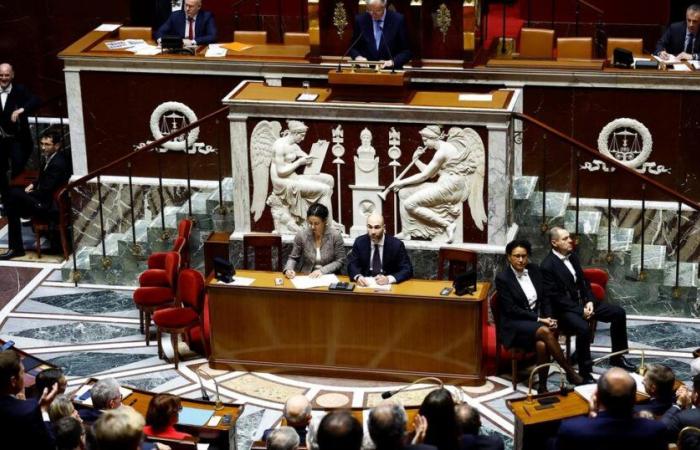
TRIBUNE – Through the vote on the motion of censure, French political life gives the image of a fractured, irreconcilable country and incapable of projecting itself into a common future, points out Gaël Nofri. The historian draws a parallel with the day of death of the man who knew, better than anyone, embody the service of the State.
Gaël Nofri is a historian, deputy mayor (Horizons) of Nice and metropolitan councilor of Nice Côte d’Azur.
History loves winks. It was December 4… 1642. Jean Armand du Plessis, Cardinal Richelieu, principal minister of the King of France, died. With him disappeared the man who will forever embody the service of the State.
It was on December 4, 2024, that this same state service in turn died out in the heart of the National Assembly. By the vote on the motion of censure, by the scene that has been orchestrated for almost a year now, French political life gives the image of a country fractured, irreconcilable and incapable of projecting itself into a common future. The idea of a service to the State, of a devotion to the Public Good is totally absent: where the Insoumis remain monopolized by their strategy of brothelization with the sole aim of pushing their maximum leader to the Elysée; where the socialists and ecologists, voluntary hostages of the New Popular Front, only think about preserving their chances of survival in the next early legislative elections announced for September; where the National Rally and its supporters play their own electoral score in the hope of overriding their judicial agenda; where the presidential camp only accepts the consequences of its failed dissolution on the condition that this has no impact on the policies followed; where the Republicans would like to hold the rudder of the country alone, notwithstanding their weight within the national representation… that is not the place of state service!
Faced with this, the role of the President of the Republic should have been central. It was time, finally time, to rise to the height of the institutions: nothing obliged us to resort to dissolution the day after the European elections, nothing prevented it either, but we still had to agree to take full advantage of it. the consequences. The call for clarification allowed nothing other than to better see a divided country and political groups hostage to their selfish reflexes. The call for democratic expression has only resulted in a denial of democracy and an unprecedented institutional blockage.
By refusing to appoint Lucie Castets and to let her be sanctioned by the National Assembly, as would have been immediately and inevitably the case, the Head of State wanted to remain sole master of the choice of the tenant of Matignon, without realizing that He thus prevented everyone from drawing the full consequences of the impasse from their own electoral strategy and their parochialism. The New Popular Front not having been beaten in the Assembly, continued to believe that it had won the vote anchoring the entire left in systematic opposition to any proposal emanating from a government that they considered illegitimate . The elements of the government bloc, called by circumstances to be the lowest common denominator although having been rejected by the European and then legislative ballots, found themselves running the country and assuming the weight of responsibilities as if they were the majority party. The bloc of the National Rally and its supporters, convinced that the winner of the 1is turn, they should have been in the second, saw in the role of arbiter of parliamentary life offered to him by the tripartition of political life, the opportunity to weigh decisively in the debate as if he were This was a reparation for an election that would have been stolen from him.
The presidential function has long been lowered, the institutions have gradually been distorted, more serious still, the spirit of parties and sterile quarrels have reappeared…
Gaël Nofri
In 1877, after the President of the Republic, Marshal de Mac Mahon, dissolved the National Assembly, Léon Gambetta, predicting the victory of the opposition, declared: “ You will have to submit or resign “. From this sentence, passed down to posterity, was born the institutional practice of the Third Republic and, to some extent, the Fourth. It is against this idea, that of a weak executive, bringing instability, disorder and partisan spirit that the Fifth Republic desired by General de Gaulle was born. It was a question of giving the Head of State the weight of legitimacy, the strength of stability and the necessary height of view.
It is clear that this is no longer the case today. The presidential function has long been lowered, the institutions have gradually been distorted, more serious still, the spirit of parties and sterile quarrels have reappeared… De Gaulle himself, presenting his main orientations during the Bayeux speech constitutional, referred to the Antiques: “ Ancient Greeks asked the wise Solon: “what is the best constitution?” “. He replied: “ Tell me first for what people and at what time ».
For our people and in our time the question is undoubtedly now to know what rules of the game would still make us want to play together. But institutions, even reformed, are not enough alone to ensure civic spirit… because in truth, fractured, irreconcilable and individualistic French political life is perhaps not just the magnified image of the worrying evolution of our entire society.





